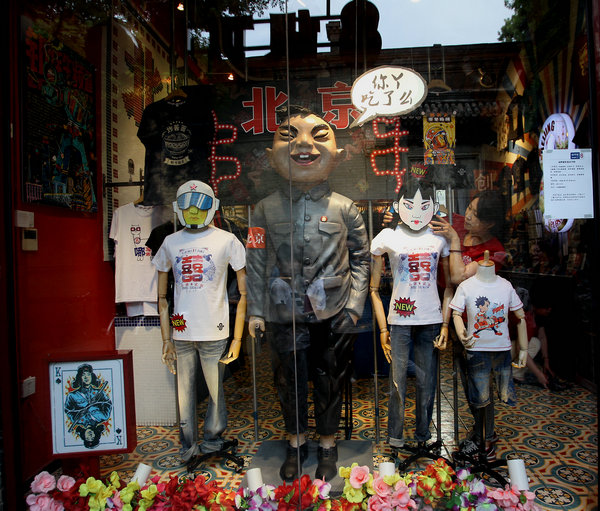 |
|
Plastered 8 store sells T-shirts with iconic imagery of Beijing.[Photo by Zhang Wei/ China Daily] |
Several tourists excitedly hold their selfie sticks to take pictures. A young couple anxiously queue up for fried chicken chop and iced milk tea. A few cyclists ring their bells and shout "Out of the way, please", trying to get through the crowds.
If you want respite you can flee to the 16 narrow alleys that shoot off to each side from the main one. An elderly woman is pruning vegetables on the roadside. A few meters away from her house is a small bar decorated with pretty flowers and beer bottles from all over the world. Suddenly, a pedicab driver is passing by and recounting a tale about the hutong to his customers.
It is difficult now to imagine that business here was sparse in the early 2000s, just a few newish bars and restaurants in the central artery. It was just another one of those quiet Beijing residential hutong, with a few small shops and a hairdresser's.
"The hutong themselves have not changed much, but the buildings are a lot different," says Liu Demei, in her 80s. She is enjoying the sun and a cooling breeze, sitting on a chair at the front gate of a traditional courtyard in a hutong next to Nanluoguxiang in Beijing.
She recalls that the commercial structures used to be walls of residential courtyards when she first settled down in the area more than 50 years ago. She never goes to the bustling street next door because it is difficult to move in the busy hours.
An Yan, 34, who lives in the area, misses the days when he was a middle school student and could close his eyes while riding a bicycle down the empty alley in the morning.
"A real hutong is dynamic and needs to have everything such as friendly residents, greenery and birds," he says.
"Nanluoguxiang is just a commercial scenic spot and reflects nothing like Beijing anymore. Commercialization gradually usurps then kills culture."
|
|
|
|
|
|
|
|
